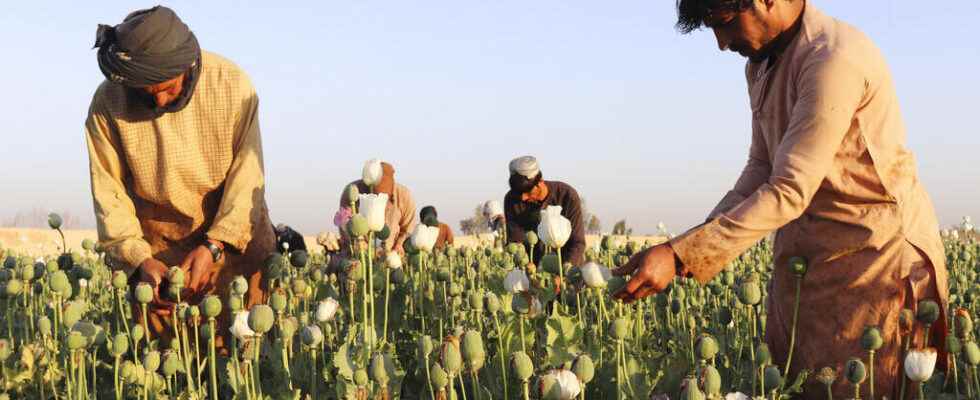Opium poppy cultivation has increased by 32% year on year in Afghanistan, according to the first report on the subject published Tuesday by the UN since the Taliban took power in August 2021.
If since their return in August 2021, the Taliban claim to want to put an end to drug consumption, the speech is less frank concerning the production of poppy, while the country is the first producer of opium in the world. Poppy cultivation increased by 32% and “ now reaches 233,000 hectares “, alert United Nations Office on Drugs and Crime (UNODC). The report further notes that opium prices ” have flown away since the Taliban banned the planting of the flower in April 2022.
► To read also: Opium: the dilemma of the Taliban
This year’s crop was largely exempt from the decree. Afghan farmers must now decide in early November whether to plant opium poppy for next year without knowing whether authorities will enforce the ban, says the body based in Vienna, Austria. They are “ trapped in the illicit opiate economy “, according to UNODC Executive Director Ghada Waly, quoted in a press release, which calls on the international community to ” step up interventions “.
#Poppy #opium According to the latest survey of @UNODC in Afghanistan, the areas of poppy have increased, but the yield per hectare having fallen, the production of opium is down while remaining at very high levels. The heroin shortage is not for tomorrow in Europe. pic.twitter.com/4uqLd2N6dL
— Observatory of International Crimes (@ObsCIcrim) November 1, 2022
World’s leading producer
Afghanistan is by far the world’s largest producer of poppy, from which opium, heroin and ” farmers’ income from the sale of opium has tripled in one year, estimates the UNODC. Between 80% and 90% of heroin and opium in the world come from Afghanistan, mainly from the southwest of the country, according to the UN. Increased from 430 million euros in 2021 to 1.4 billion euros in 2022, it is the ” most profitable recorded for years and represents 29% of the country’s total agricultural value, compared to 9% a year earlier.
However, the increase in income has not necessarily translated into purchasing power, as inflation has soared over the same period, with food prices rising by an average of 35 percent, says the ‘UNODC.
A windfall for the Taliban
Seizures of opiates in countries bordering Afghanistan indicate that the trafficking of Afghan opium and heroin has not ceased.
The cultivation of the flower was briefly prohibited in 2000 by the Taliban, a few months before the fundamentalist regime was overthrown by the international coalition in response to the attacks of September 11, 2001. During their twenty years of guerrilla warfare against foreign forces, the Taliban heavily taxed poppy growers in areas under their control, making the crop an important source of income for them.
During their presence in Afghanistan, the United States and its NATO allies tried to encourage farmers to produce wheat or saffron. Initiatives that failed, while the Taliban controlled the main poppy production areas.
(with AFP)
